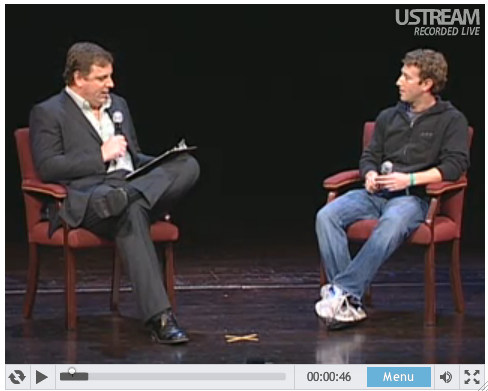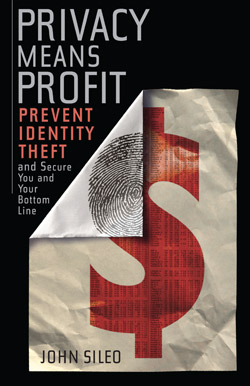Home | Solutions Blog | John Sileo
Posts tagged "John Sileo"
Detection: Fraud and Identity Theft.
“Consumers are spending considerably more time on fraud Resolution, up to an average of 30 hours in 2008. This increase may be attributed to the increased sophistication of fraud schemes.”
– 2009 Identity Fraud Survey Report, Javelin Strategy & Research
Most cases of identity theft are discovered by the victim, which reinforces the importance of monitoring your various accounts for suspicious behavior. Here are a few of the most common warning signs for the detection of fraud, identity theft or data breach:
The Top 15 Ways Victims Detect Identity Theft
- You receive a data breach notice in the mail from a company you do business with.
- Your bills or statements are not arriving in your mail (or email) on time.
- You notice unauthorized charges on your credit card bill or debit card statement.
Posted in Identity Theft Prevention by Identity Theft Speaker John Sileo.
Tags: detecting fraud, Detection Fraud, Fraud, fraud detecting, Fraud Detection, identity theft expert, Identity Theft Prevention, John Sileo, Privacy
 What began in early 2009 as a free ‘information network’ that offers users the ability to microblog may have already reached the top. A new CNN article discusses how the number of Twitter users has flattened out and even deccreased recently. In July 2009, the site had 21.2 million users which dropped to 19.9 users only 5 months later in December.
What began in early 2009 as a free ‘information network’ that offers users the ability to microblog may have already reached the top. A new CNN article discusses how the number of Twitter users has flattened out and even deccreased recently. In July 2009, the site had 21.2 million users which dropped to 19.9 users only 5 months later in December.
Some believe this slump is due to Twitter’s inability to keep up with its users and others are finding the site less and less useful. Perhaps people are less inclined to put so much personal information on the World Wide Web, knowing that everything you post is public, permanent and exploitable. Or maybe we’re just tired of seeing how boring the average person’s day is.
Click Here to read this entire article.
Posted in Online Privacy by Identity Theft Speaker John Sileo.
Tags: identity theft expert, John Sileo, Online/Social Media Privacy, social networking, twitter
 What started in 1997 as a research project and a mission as the way to organize the world’s information has turned into the worlds largest search engine. Google has given anyone with an Internet connection access to more information than they realize. With such quick access to information, you need to be careful what you put on the World Wide Web and realize what is contained in your Google History. Remember, posts – and searches – are permanent. Here are a few privacy issues when it comes to Google:
What started in 1997 as a research project and a mission as the way to organize the world’s information has turned into the worlds largest search engine. Google has given anyone with an Internet connection access to more information than they realize. With such quick access to information, you need to be careful what you put on the World Wide Web and realize what is contained in your Google History. Remember, posts – and searches – are permanent. Here are a few privacy issues when it comes to Google:
1. Google’s Cookie and Toolbar. When you use their search engine, Google places a self-renewing cookie with a unique ID number on your hard disk. As you search websites, Google records your surfing activity and saves your searches. There are ways to change your Internet options to stop the cookie tracking and you can learn more by visiting www.google.com/support/accounts/.Remember, nothing you do on the Internet is private; it is all tracked, aggregated, analyzed, sold and used for a variety of purposes (many of them good). The advanced features of Google’s new toolbar for Internet Explorer not only updates automatically, but it also tracks which websites you visit.
Posted in Identity Theft Prevention by Identity Theft Speaker John Sileo.
Tags: Google History, Google Privacy, John Sileo, John Sileo Identity theft Expert, social engineering, Social Networking Speaker

Mark Zuckerberg, CEO of Facebook, was interviewed just last week by Mike Arrington, co-founder of TechCrunch. They discussed privacy and how Facebook is looking to move forward in the future. Zuckerberg made some really interesting comments on Facebook, but I think the most prevalent to Identity Theft would be what he said on the progression of information sharing.
“People have really gotten comfortable, not only sharing more information and different kinds, but more openly and with more people.”
Zuckerberg also said that when Facebook began most people thought: why would I put any information on the internet at all? Now most users don’t think twice about privacy before making posts. Due to the Privacy changes Facebook made in December, your name, profile picture, gender, current city, networks, Friends List, and all the pages you subscribe to are now publicly available information on Facebook. Many people feel that this is a contradiction to what Zuckerberg had said before — that Facebook privacy controls are “the vector around which Facebook operates.” With more than 350 million users on Facebook, privacy is more important than ever.
Posted in Identity Theft Prevention, Online Privacy by Identity Theft Speaker John Sileo.
Tags: Facebook, facebook privacy, facebook privacy expert, John Sileo, Mark Zuckerberg, social engineering expert, social networking

Since you can’t protect yourself 100% from identity theft, make sure that you Monitor the Signs! Heading into a new year people make many resolutions that they may or make not stick with, but protecting your identity should always be a top priority. Here are 3 effective tips to help discover and recover quickly if you become the victim of identity theft:
- Create a Dossier – A dossier is a collection of documents that are stored in a fire-safe and that you regularly review and update. It is a paper summary of your identity as the outside world sees it (businesses, organizations and governments). It is made up of several key documents: your credit report, bank and credit card statements, Social Security statement, wallet photocopies and your password list. Virtually any of your vital documents could be included in your dossier as well (birth certificates, marriage licenses, etc.). A dossier is a place where you can quickly access a complete record of your vital information in case your identity is stolen and you will have the necessary account and phone numbers at hand to cancel credit cards, bank accounts and to file credit disputes. And you can do it quickly.
Posted in Identity Theft Prevention by Identity Theft Speaker John Sileo.
Tags: Credit Report, identity theft expert, Identity theft recovery, John Sileo, Monitor
 During your fraud training exercises, fostering an attitude of curiosity (or in the corporate world, a culture of curiosity) is the most powerful critical thinking skill in your arsenal of tools to protect sensitive information. Employees who can think critically and ask the right questions regarding data privacy make up the fabric that supports a Culture of Privacy. Interrogation is the art of questioning someone thoroughly and assertively to verify intentions, identities and facts.
During your fraud training exercises, fostering an attitude of curiosity (or in the corporate world, a culture of curiosity) is the most powerful critical thinking skill in your arsenal of tools to protect sensitive information. Employees who can think critically and ask the right questions regarding data privacy make up the fabric that supports a Culture of Privacy. Interrogation is the art of questioning someone thoroughly and assertively to verify intentions, identities and facts.
Questions: Who’s in Control? Can I Verify? What are my Options? What are the Benefits?
When spies need information, they ask for it. They “socially engineer” or con their victims with a variety of tools.
The primary tool for evaluating risk once your reflexes have been triggered (Hogwash) is to interrogate the person or institution asking for your information. Interrogation is not meant to be about forceful or physical questioning. I define interrogation as clear, aggressive questioning used to establish whom you can trust, how far you can trust them, and with what information.
Posted in Fraud Detection & Prevention, Identity Theft Prevention by Identity Theft Speaker John Sileo.
Tags: Data Breach, Engineering Social, Fraud Training, John Sileo, Privacy Means Profit, social engineering, Training Fraud
If it seems too good to be true, it probably is. 
That is the best way to Think Like A Spy and be alert of Social Engineers that are trying to manipulate you. With such a gloomy economy and many people without work, offers for fast cash and huge discounts become more and more attractive. Most of these Identity Theft cases use the technique of Social Engineering.
Social Engineering is the act of manipulating people into performing actions or divulging confidential information by playing on their human emotions. The term typically applies to deception for the purpose of information gathering, fraud, or computer system access; in most cases the attacker never comes face-to-face with the victim. These days most thieves can nab your identity over the phone, mail, email, and through social networking sites such as Facebook and Twitter.
Posted in Fraud Detection & Prevention, Identity Theft Prevention, Online Privacy by Identity Theft Speaker John Sileo.
Tags: Facebook, Human Emotions, identity theft expert, Identity Theft Prevention, John Sileo, Online/Social Media Privacy, social engineering, Think Like A Spy, twitter

The Privacy Reflex
When I am training corporate executives, managers and employees to detect fraud and social engineering (manipulative information-gathering techniques), I take them through what it feels like to be conned. In other words, I actually socially engineer them several times throughout the presentation so that they begin to reflexively sense when more fraud is coming. There is no substitute for experiencing this first hand.
The Trigger—Requests for Identity
Spies are trained to instantly react when anyone asks for information of any kind, whether it is theirs or someone else’s. The trigger, or what causes you to be on high alert, is actually very simple—it is the appearance of your identity in any form (wallet, credit card, tax form, passport, driver’s license, etc.). Anytime someone requests or has access to any of the names, numbers or attributes that make up your identity, or to the paper, plastic, digital or human data where your identity lives, the trigger should trip and sound an alarm in your head.
Posted in Identity Theft Prevention by Identity Theft Speaker John Sileo.
Tags: Data Breach, Hogwash, identity theft expert, Identity Theft Prevention, Identity Theft Speaker, John Sileo, Privacy, social engineering
 Tareq and Michaele Salahi — Washington socialites are not just known for their possible roles in the upcoming “The Real Housewives of Washington,” but for being seen arriving at the White House State Dinner. The problem was that they weren’t on the guest list, but managed to work their way inside what is supposed to be the most secure party.
Tareq and Michaele Salahi — Washington socialites are not just known for their possible roles in the upcoming “The Real Housewives of Washington,” but for being seen arriving at the White House State Dinner. The problem was that they weren’t on the guest list, but managed to work their way inside what is supposed to be the most secure party.
The couple took to Facebook to document their party-crashing, and on Wednesday, Michaele Salahi’s Facebook page included photos of the couple at the dinner. The Salahis weren’t exposed until journalists caught sight of pictures showing the Salahis posing with President Barack Obama, Vice President Joe Biden and others. In the aftermath, the security breach looked more like a publicity stunt than a security threat. The Secret Service admitted that they did not verify at each checkpoint that this couple was on the invitation list. In other words, they missed the second cardinal rule of security, Verify.
Posted in Online Privacy by Identity Theft Speaker John Sileo.
Tags: Facebook, identity theft expert, Identity Theft Speaker, John Sileo, Online/Social Media Privacy, social engineering, social networking, White House, White House Party Crashers
 What began in early 2009 as a free ‘information network’ that offers users the ability to microblog may have already reached the top. A new CNN article discusses how the number of Twitter users has flattened out and even deccreased recently. In July 2009, the site had 21.2 million users which dropped to 19.9 users only 5 months later in December.
What began in early 2009 as a free ‘information network’ that offers users the ability to microblog may have already reached the top. A new CNN article discusses how the number of Twitter users has flattened out and even deccreased recently. In July 2009, the site had 21.2 million users which dropped to 19.9 users only 5 months later in December. What started in 1997 as a research project and a mission as the way to organize the world’s information has turned into the worlds largest search engine. Google has given anyone with an Internet connection access to more information than they realize. With such quick access to information, you need to be careful what you put on the World Wide Web and realize what is contained in your Google History. Remember, posts – and searches – are permanent. Here are a few privacy issues when it comes to Google:
What started in 1997 as a research project and a mission as the way to organize the world’s information has turned into the worlds largest search engine. Google has given anyone with an Internet connection access to more information than they realize. With such quick access to information, you need to be careful what you put on the World Wide Web and realize what is contained in your Google History. Remember, posts – and searches – are permanent. Here are a few privacy issues when it comes to Google:

 During your fraud training exercises, fostering an attitude of curiosity (or in the corporate world, a culture of curiosity) is the most powerful critical thinking skill in your arsenal of tools to protect sensitive information. Employees who can think critically and ask the right questions regarding data privacy make up the fabric that supports a Culture of Privacy. Interrogation is the art of questioning someone thoroughly and assertively to verify intentions, identities and facts.
During your fraud training exercises, fostering an attitude of curiosity (or in the corporate world, a culture of curiosity) is the most powerful critical thinking skill in your arsenal of tools to protect sensitive information. Employees who can think critically and ask the right questions regarding data privacy make up the fabric that supports a Culture of Privacy. Interrogation is the art of questioning someone thoroughly and assertively to verify intentions, identities and facts.

 Tareq and Michaele Salahi — Washington socialites are not just known for their possible roles in the upcoming “The Real Housewives of Washington,” but for being seen arriving at the White House State Dinner. The problem was that they weren’t on the guest list, but managed to work their way inside what is supposed to be the
Tareq and Michaele Salahi — Washington socialites are not just known for their possible roles in the upcoming “The Real Housewives of Washington,” but for being seen arriving at the White House State Dinner. The problem was that they weren’t on the guest list, but managed to work their way inside what is supposed to be the 







